Related Research Articles

Earl Bathurst, of Bathurst in the County of Sussex, is a title in the Peerage of Great Britain.

Apsley George Benet Cherry-Garrard was an English explorer of Antarctica. He was a member of the Terra Nova expedition and is acclaimed for his 1922 account of this expedition, The Worst Journey in the World.
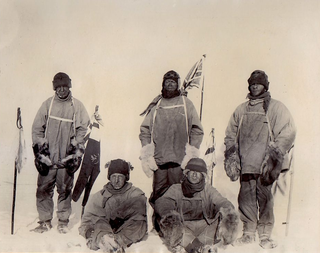
Henry Robertson Bowers was one of Robert Falcon Scott's polar party on the ill-fated Terra Nova expedition of 1910–1913, all of whom died during their return from the South Pole.

William Lashly was a Royal Navy seaman who served as lead stoker on both the Discovery expedition and the Terra Nova expedition to Antarctica, for which he was awarded the Polar Medal. Lashly was also recognised with the Albert Medal for playing a key role in saving the life of a comrade on the second of the two expeditions.
Sir Thomas Hutchinson was an English MP.

George Murray Levick was a British Antarctic explorer, naval surgeon and founder of the Public Schools Exploring Society.
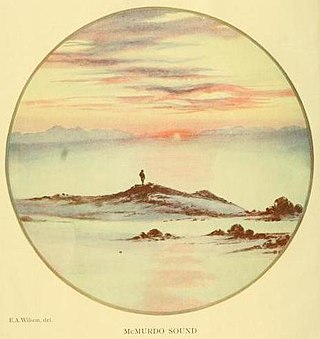
The Worst Journey in the World is a 1922 memoir by Apsley Cherry-Garrard of Robert Falcon Scott's Terra Nova expedition to the South Pole in 1910–1913. It has earned wide praise for its frank treatment of the difficulties of the expedition, the causes of its disastrous outcome, and the meaning of human suffering under extreme conditions.

A degree of frost is a non-standard unit of measure for air temperature meaning degrees below melting point of water. "Degree" in this case can refer to degree Celsius or degree Fahrenheit.
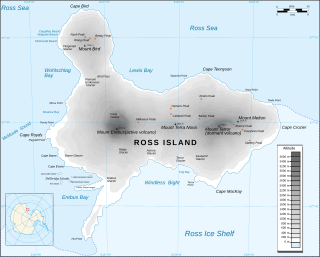
Cape Crozier is the most easterly point of Ross Island in Antarctica. It was discovered in 1841 during James Clark Ross's expedition of 1839 to 1843 with HMS Erebus and HMS Terror, and was named after Francis Crozier, captain of HMS Terror. The extinct volcano Mount Terror, also named during the Ross expedition, rises sharply from the Cape to a height of 3,230 m (10,600 ft), and the edge of the Ross Ice Shelf stretches away to its east.

Patrick Keohane was an Irish member of Robert Falcon Scott's Antarctic expedition of 1910–1913, the Terra Nova expedition.
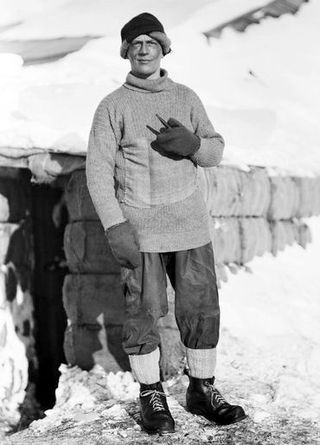
Edward Leicester Atkinson, was a Royal Navy surgeon and Antarctic explorer who was a member of the scientific staff of Captain Scott's Terra Nova Expedition, 1910–13. He was in command of the expedition's base at Cape Evans for much of 1912, and led the party which found the tent containing the bodies of Scott, "Birdie" Bowers and Edward Wilson. Atkinson was subsequently associated with two controversies: that relating to Scott's orders concerning the use of dogs, and that relating to the possible incidence of scurvy in the polar party. He is commemorated by the Atkinson Cliffs on the northern coast of Victoria Land, Antarctica, at 71°18′S168°55′E.
Denford Park is a country house and surrounding estate in the English county of Berkshire, within the civil parish of Kintbury.
The Worst Journey in the World is a 2007 BBC Television docudrama based on the memoir of the same name by polar explorer Apsley Cherry-Garrard. Narrator Barry Letts, best known for his tenure as the producer of Doctor Who, played Cherry-Garrard in the 1948 film Scott of the Antarctic.
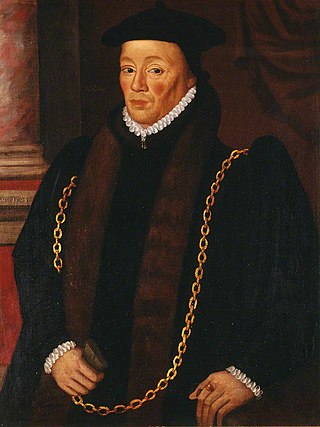
Sir William Garrard (1518–1571), also Garrett, Gerrarde, etc., was a Tudor magnate of London, a merchant citizen in the Worshipful Company of Haberdashers, who became alderman, Sheriff (1552–1553) and Lord Mayor of London (1555–1556) and was returned as an MP for the City of London. He was a senior founding officer of the Company of Merchant Adventurers to New Lands in 1554/55, having been involved in its enterprises since the beginnings in King Edward VI's time, and for the last decade of his life was one of its permanent governors. He worked hard and invested largely to expand English overseas trade not only to Russia and the Levant but also to the Barbary Coast and to West Africa and Guinea.
Garrard Glacier is a glacier in the Queen Alexandra Range of Antarctica, draining eastward from the névé between Mount Lockwood and Mount Kirkpatrick and entering Beardmore Glacier south of Bell Bluff. It appears that the British Antarctic Expedition, 1910–13, applied the name "Garrard Glacier" to the feature which had been named Bingley Glacier by Ernest Shackleton in 1908. The area was surveyed by the New Zealand Geological Survey Antarctic Expedition (1961–62), who retained Bingley Glacier on the basis of priority and reapplied the name Garrard Glacier to this previously unnamed feature. The name is for Apsley Cherry-Garrard, a zoologist with the British Antarctic Expedition.
There have been two baronetcies created for persons with the surname Garrard, both in the Baronetage of England. Both creations are extinct.
Garrard is a surname. Notable people with the surname include:
Apsley may refer to:
Lieutenant-Colonel Charles Drake Garrard, born Charles Drake was a British land-owner and Member of Parliament for Amersham between 1796 and 1805.
Sir John Garrard, 3rd Baronet (1638–1701), was an English politician.
References
- ↑ Namier, Sir Lewis; Brooke, John, eds. (1964). "CHERRY, George Henry (1793-1848), of 9 Gloucester Place, Portman Square, Mdx.". The House of Commons 1754-1790. The History of Parliament Trust. Retrieved 16 November 2022.
- ↑ Hughes, A. (1898). List of Sheriffs for England and Wales from the Earliest Times to A.D. 1831. London: Eyre & Spottiswoode. p. 8. (with amendments of 1963, Public Record Office)